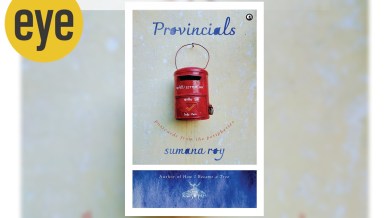Sumana Roy’s latest The Provincials explores the slow degradation in the quality of attention we pay to people and things around us
Who is a provincial, really? The provincial is not a victim, writes Roy, but a more nebulous creature, caught between the town and the metropolis, the colony and the coloniser

The Warburg Institute Library in London, the most eccentric of its kind, is organised on the taxonomic conviction that there exist infinite unconscious connections that enjoin cultural memories, and is founded, above all, on the “law of the good neighbour”. Thus, a scholar might stumble upon a history of playing cards sitting right next to a tome on fortune telling, a book of astronomy standing close to a treatise on alchemy. A library of serendipity, it has been dubbed, for you never know where things might lead you.
It is such a flavour of serendipitous neighbourliness that animates Sumana Roy’s latest book Provincials: Postcards from the Peripheries. Who is a provincial, really? The provincial is not a victim, she clarifies, but a more nebulous creature, caught between the town and the metropolis, the colony and the coloniser, anonymity and pedigree, the soil and the sky. Roy’s heart lies in her hometown Siliguri — part of the “chicken’s neck” which connects the Northeast to the central plains — but her fascination for all things provincial leads us across time and space. We fly from Rabindranath Tagore to JM Coetzee to the Bhakti movement (a special moment in history when god, too, became a provincial, we learn), even as we glimpse evocative scenes from Roy’s pre-Nineties childhood in her own province. These are filled with vignettes that make you chortle with laughter, and many — like her fraught relationship with English pronunciation — make you gasp in solidarity. The peculiar desi cocktail of Tinkle comics, Enid Blyton novels, and Hallmark-style gift shops did not fail to warm me with nostalgia either, for those were an integral part of my own provincial experience, growing up as I did in the bookshop-starved city of Mysore, two decades her junior, more than 2,000 km away. We are all neighbours, after all, in one way or the other.
Halfway through the book, I feel like I’ve gotten a hang of what exactly characterises a provincial, but the surprises are unending. I’ve breezed through Shakespeare, DH Lawrence, and the “peasant poet” John Clare, visited Heidegger at his quaint cabin in the Black Forest, and here comes a curveball — the French philosopher Jacques Derrida has arrived (I didn’t know he was a Jew born in Algeria), and he, too, can be deconstructed meaningfully as a provincial traveller from the margins of the French empire. By the time I arrive at Kishore Kumar (born in the small town of Khandwa before Bombay turned him into a superstar), I have learnt to expect the unexpected. All these literary, philosophical, and biographical sketches, driven by “accidents, autodidacticism, and astonishment”, are charming and stimulating in equal measure. Roy, as it turns out, is just like all the other omnivorous provincials in her book who hunger for a diversity of source material. Tales of tragedy abound too — like the case of the Hindi writer Bhuwaneshwar (once celebrated by no less a figure than Premchand) who spent his last years living in railway stations and street corners, driven mad by poverty and deprivation. Is death a province? Is death more provincial than life?
Words that begin with p (language no bar) are her pet projects throughout the book, and she loves playing the linguistic detective. In what turned out to be one of my favourite sections, she tracks down the etymology of the Bangla word palli, journeying through its cousins in numerous Indian languages, before finally arriving at a devastating common denominator — “in that word is the intimation of a way of life that has been left behind, that must be left behind, even thought it might be precious”. This melancholia pervades the book, and any nostalgia must reckon with this overwhelming feeling of decay. When a leaf begins to dry, it is the edges that start curling first. This book is a history of those curls — the preface has already warned us, preparing us for the inevitable.
Through all these and more (much more), we are offered poignant ways to reflect on, and mourn, what she calls “the gradual evaporation of the poetic from our culture”, a steady degradation in the quality of attention that we pay to people and things around us. The age of information is upon us, and “with the free-flowing tap of reading material available on the internet, there is only excess, cacophony, a bricolage of ugly fragments divorced from their contexts.” Where lies the road to recovery? Perhaps, we could begin by understanding our own neighbourhoods and backyards in more wholesome ways. In the end, after all the rescuing of provincial heroes and provincial tales from the simplistic rhetoric of quaintness and marginality, the book has approached that rare quality — a poetic universalism — which was really the whole point all along.
Raghavan is a New India Foundation fellow. His book, Rama, Bhima, Soma is forthcoming